News & Updates
Lotus - A trusted name in family travel
Fujian Province
Fujian is mostly mountainous, and is traditionally described to be "Eight parts mountain, one part water, and one part farmland" (八山一水一分田).

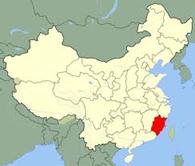 Due to the mountainous landscape and inability to develop a full transportation network, Fujian was the most secluded province of the PRC in eastern China until after the 1950s. The slow development of Fujian in its early days has proven a blessing for the province's ecology. Today, the province has the highest forest coverage rate (more than 60%) and the most diverse biosphere in China. Recently, Fujian has been thriving and it has benefited greatly from its geographic and cultural proximity to Taiwan
Due to the mountainous landscape and inability to develop a full transportation network, Fujian was the most secluded province of the PRC in eastern China until after the 1950s. The slow development of Fujian in its early days has proven a blessing for the province's ecology. Today, the province has the highest forest coverage rate (more than 60%) and the most diverse biosphere in China. Recently, Fujian has been thriving and it has benefited greatly from its geographic and cultural proximity to Taiwan
Historically, Fujian has always been one of the more prosperous provinces of China, because of its proximity to the coast and resulting access to trade. . After the Second World War, however, Fujian's traditional trade with Japan was reduced and her other main customer, Taiwan, was the enemy. Agriculture is important, as Fujian produces a great deal of tea, particularly several excellent Oolong teas. Fishing and fish farming are important industries and the local cuisine emphasizes seafood.
What to See
Fujian has a rich history, famous historical sites and many beautiful natural landscapes. So, it is a great place to visit, and as a bonus, it is still “off the path” and retains a low-key charm as a result.
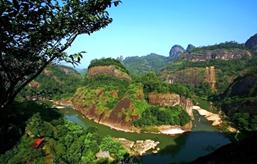 Wuyishan:
Wuyishan:
One of the “must see” locales here is Mount Wuyi (Wu Yi Shan). It is considered a wonderland with beautiful mountains, jagged rocks and its serene and crystal clear waters. If you are fit for a hike, you may climb up this mountain and enjoy the view from the top. It is worth it! It takes about an hour to reach the top and half an hour to come down. There is also a scenic bamboo raft ride down the river, which is great fun. The ride takes about one-and-the-half hours. Each raft comes with two rowers and can take six passengers. Along the way, you can see huge rocks of different shapes and sizes - some of which resemble people or animals. There is also a unique historical mystery in this place. There are “hanging coffins" - coffins, believed to be more than 2000 years old that have been placed inside large cracks in some of the gigantic rocks. These cracks are about 60-120 feet above the river. To this day, no one knows how the coffins were placed there, particularly given the engineering knowledge of 2000 years ago.
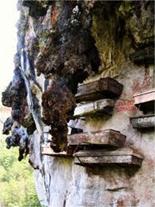 Gulangyu is southwest of Xiamen Island, and is known as “The Garden of the Sea”. This island is warm in the winter and cool in the summer, as if it experiences spring all year around. It has lovely sea breezes, sunshine and stunning Mediterranean architecture. All kinds of flowers bloom, and the grass and leaves are always green. It is an ideal spot to spend time during a visit to Fujian.
Gulangyu is southwest of Xiamen Island, and is known as “The Garden of the Sea”. This island is warm in the winter and cool in the summer, as if it experiences spring all year around. It has lovely sea breezes, sunshine and stunning Mediterranean architecture. All kinds of flowers bloom, and the grass and leaves are always green. It is an ideal spot to spend time during a visit to Fujian.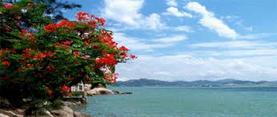
Overall, Fujian has a pleasant climate, with mild winters. The typical coldest temperatures reach approximately 40°F in the month of January; the hottest month of July has a temperature that ranges between 75°- 86°F. Fujian has a subtropical climate, with its mild winters and abundant rainfall.
People & Language
In Fujian, Han Chinese makes up e 98% of the population.
 Because of its mountainous nature and the numerous waves of migration from central China during the course of history, Fujian is one of the most linguistically diverse places in all of the Han Chinese areas of China. At one time nearly every valley had its own language. Fujian also has dozens of its own dialects; local dialects can become unintelligible, traveling a distance of less than 10 miles. This is reflected in the common saying, “If you drive five miles in Fujian the culture changes, and if you drive ten miles, the language does". Classification of these various dialects has confounded linguists. These dialects are usually described with the prefix "Min" since Min is another name for Fujian. These dialects are not mutually understandable, though they do share certain common features. Generally speaking, the "Min" group of Chinese dialects is the most different from standard Mandarin of all the dialects and has fewer similarities with Mandarin as compared to English would have with Dutch.
Because of its mountainous nature and the numerous waves of migration from central China during the course of history, Fujian is one of the most linguistically diverse places in all of the Han Chinese areas of China. At one time nearly every valley had its own language. Fujian also has dozens of its own dialects; local dialects can become unintelligible, traveling a distance of less than 10 miles. This is reflected in the common saying, “If you drive five miles in Fujian the culture changes, and if you drive ten miles, the language does". Classification of these various dialects has confounded linguists. These dialects are usually described with the prefix "Min" since Min is another name for Fujian. These dialects are not mutually understandable, though they do share certain common features. Generally speaking, the "Min" group of Chinese dialects is the most different from standard Mandarin of all the dialects and has fewer similarities with Mandarin as compared to English would have with Dutch.
Culture: Food and Tea
(AKA: “Buddha jumps over the wall” )
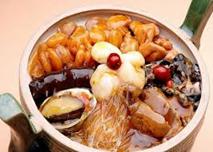
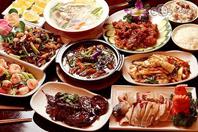 Fujian cuisine has an emphasis on seafood and is one of the eight great traditions of Chinese (click: 8 Cuisines of China for the complete article). One of the most popular dishes of Fujian cuisine is "Buddha jumps over the wall" (Fotiaoqiang). It is a complex soup which uses more than 20 ingredients, including shark fin, sea cucumber, abalone, and Shaoxing wine. It requires one to two full days to create. The name of the dish reflects the appeal of the soup. It is said to be so enticing that even a vegetarian monk (Buddha) himself could not restrain himself and if necessary to get the soup, would sneak out of the monastery (literally "jump over the wall") to steal a taste.
Fujian cuisine has an emphasis on seafood and is one of the eight great traditions of Chinese (click: 8 Cuisines of China for the complete article). One of the most popular dishes of Fujian cuisine is "Buddha jumps over the wall" (Fotiaoqiang). It is a complex soup which uses more than 20 ingredients, including shark fin, sea cucumber, abalone, and Shaoxing wine. It requires one to two full days to create. The name of the dish reflects the appeal of the soup. It is said to be so enticing that even a vegetarian monk (Buddha) himself could not restrain himself and if necessary to get the soup, would sneak out of the monastery (literally "jump over the wall") to steal a taste.
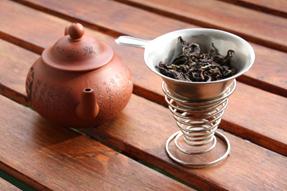 The production of Fujian tea is a time-honored tradition with historical accounts traced back over 1,600 years. Special Fujian teas were often used in tribute given at imperial courts. Fujian Province has an important role in producing all five categories of tea-black, green tea, and oolong, white and scented tea. With the exception of green tea, every other tea was pioneered in Fujian province. Lapsang Souchong (black) and white tea are considered unique Fujian specialties. The world famous Oolong has been introduced to some other regions. Scented tea, especially jasmine tea benefits from the forested, natural environment of Fujian with high quality flowers and suitable tea leaves. Fujian is considered the premier location for jasmine tea throughout all of China. There are 336 varieties of tea trees in the province and is considered the treasury of the country's tea species. Also, the Fujian tea ceremony is an elaborate way of preparing and serving tea. In fact, the English word "tea" is borrowed from Minnan language.
The production of Fujian tea is a time-honored tradition with historical accounts traced back over 1,600 years. Special Fujian teas were often used in tribute given at imperial courts. Fujian Province has an important role in producing all five categories of tea-black, green tea, and oolong, white and scented tea. With the exception of green tea, every other tea was pioneered in Fujian province. Lapsang Souchong (black) and white tea are considered unique Fujian specialties. The world famous Oolong has been introduced to some other regions. Scented tea, especially jasmine tea benefits from the forested, natural environment of Fujian with high quality flowers and suitable tea leaves. Fujian is considered the premier location for jasmine tea throughout all of China. There are 336 varieties of tea trees in the province and is considered the treasury of the country's tea species. Also, the Fujian tea ceremony is an elaborate way of preparing and serving tea. In fact, the English word "tea" is borrowed from Minnan language.
History
Fujian is called “Min” for short, which is derived 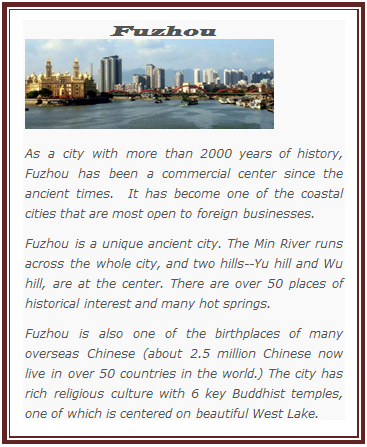 from the name of Minzhongjun Prefecture, which was set up by the First Emperor of the Qin Dynasty some two thousand years ago after they had unified China. The name “Fujian" comes from the combination of Fuzhou and Jian'ou. Fuzhou is the capital of Fujian, while Jianou is a name of a county level city in the Nanping area. It was named during the Tang Dynasty. As one of the best locales for China to connect to other regions, Fujian became a key trade center and cultural exchange location in China’s history. At the age of ancient "maritime silk road", merchant ships sets sail from Fujian province carrying Chinese silk, porcelain and tea to the Mediterranean, East Africa as well as West Asia, and Southeast Asia.
from the name of Minzhongjun Prefecture, which was set up by the First Emperor of the Qin Dynasty some two thousand years ago after they had unified China. The name “Fujian" comes from the combination of Fuzhou and Jian'ou. Fuzhou is the capital of Fujian, while Jianou is a name of a county level city in the Nanping area. It was named during the Tang Dynasty. As one of the best locales for China to connect to other regions, Fujian became a key trade center and cultural exchange location in China’s history. At the age of ancient "maritime silk road", merchant ships sets sail from Fujian province carrying Chinese silk, porcelain and tea to the Mediterranean, East Africa as well as West Asia, and Southeast Asia.
Today, Fujian is a province is an ideal location to visit and experience an "off path” spot to explore and spend time. It has a rich history, is a home province for many adoptive families and offers a lot of options for the family wishing to return and experience a bit of regular life in China. To schedule a time to visit Fujian province, explore the rich tea history, hike some interesting spots, or just eat many unique seafood dishes and explore what Fujian offers, contact us at louie@lotustours.net.
Sources: Lotus Travel website, Wikipedia, Wiki Travel, meiguoxing.com , Fujian.com, fujiantea.com